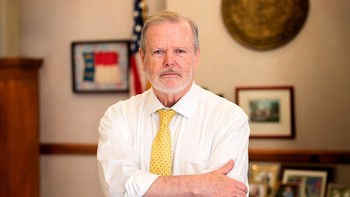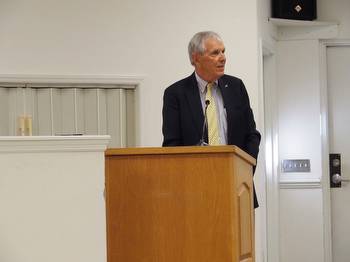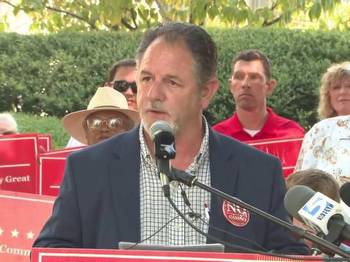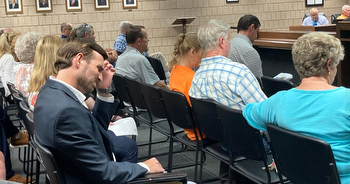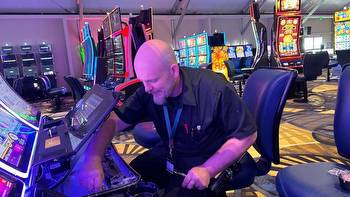North Carolina considers new casinos as money flows across Virginia border
North Carolina lawmakers are considering a plan to allow up to four new casinos in rural areas of the state. They see a recently opened casino in Danville, Virginia — a few miles north of the state line — as an example of how gambling could help economically challenged communities.
Caesars opened a temporary casino in Danville in May in a giant air-conditioned tent. Upbeat music and the faint smell of cigarettes fill the air (yes, indoor smoking is allowed) as visitors try their luck on rows of brightly colored slot machine screens. Even on a weekday afternoon, the place is busy, with a parking lot full of cars — many of them sporting North Carolina plates.
Just behind the tent at the site of a long-abandoned textile mill, construction crews are building a much larger facility. When it opens next year, it will include a 500-room hotel and convention center with a 2,500-seat theater – the sort of facility that could draw performances and business conferences that Danville hasn’t hosted before.
The Danville facility is one of several new casinos authorized by Virginia’s legislature, and most are near the state’s southern border with North Carolina.
Danville City Manager Ken Larking says his city’s residents overwhelmingly voted in favor of the casino plan after seeing the Caesar’s proposal.
“What they were proposing was a full-fledged resort, with a lot of amenities,” Larking said. “It wasn't just going to be a casino: There's going to be a big hotel, it's going to be at least a four-star quality hotel, spa, fitness center, pool, entertainment venue, conference center, and then the possibility of multiple phases after that.”
North Carolina leaders see similar benefits if more casinos are allowed here. Senate leader Phil Berger’s Rockingham County home is about 20 miles from the Danville casino, and he’s been watching it closely.
Berger says casinos could help poorer counties that need the jobs and investment.
“One of the things that convinced me that it’s the right thing to do was the idea that these entertainment areas, rural tourism areas, are things that provide a boost to the economy in counties that a boost has not been forthcoming,” Beger said. “Even with all the great things that are happening around the state … we still have places that have not grown much.”
The legislation under consideration requires casino operators to spend a minimum amount at four sites across the state. The likely locations include Rockingham, Nash and Anson counties, and a site in southeastern North Carolina. But draft legislation opens the door to alternative sites in Caswell, Vance, Wilson and Warren counties. The southeastern site would be operated by the Lumbee Tribe, while a private company would get a state contract for the others.
“For me, anyway, the idea of a commitment for an investment of at least $1.5 billion, job creation of at least 5,200 jobs, with no taxpayer dollars going into it – just struck me as kind of a sweet spot if we’re going to authorize additional gaming,” Berger said.
But it’s a proposal that’s dividing the GOP. One of the leading opponents of the casino proposal is former Congressman Mark Walker, a Republican running for governor.
The proposed casino site in Rockingham County is close to his Greensboro home, and he recently organized a meeting that drew hundreds of concerned locals. Several local governments in the proposed casino areas — including Nash County and the Guilford County town of Stokesdale — have called for a voter referendum on the plan. That's how casino legalization took place in Virginia, and voters in the state capital of Richmond rejected the idea, although supporters are trying to put the issue on the ballot again.
“As a former pastor seeing people with different addiction problems, whether it be drugs or whether it be gambling, those are incredible hardships that families undergo,” Walker said. “Personally, I would vote against it. But I think the larger issue is specifically how this has played out as opposed to just having a casino or not.”
Campaign donations, lobbying ramp up
The legislation hasn’t been formally introduced yet, but Baltimore-based casino developer The Cordish Companies is already seeking rezoning for a Rockingham County site that’s just across the county line from Greensboro.
Joseph Weinberg, an executive who oversees the companies’ casino operations, gave the maximum legal amount to the re-election campaigns of Berger, House Majority Leader John Bell and two other Republicans late last year. Campaign finance records show Weinberg has never before made campaign donations in North Carolina.
Cordish and its subsidiaries have registered eight lobbyists in North Carolina this year, including Gov. Roy Cooper’s former Commerce Secretary, Tony Copeland, and former state Republican Party chairman Tom Fetzer.
Walker says the campaign money is a bad look.
“So, there's a lot of things here that just don't pass the smell test,” Walker said. “I was blessed to serve in the fourth-highest position in Congress on the Republican side — I know how some of this stuff works. And when people start cashing checks, they're feeling like they're getting to a place of a point of no return.”
A spokesman for Berger’s campaign says he doesn’t allow campaign contributions to be tied to policy issues.
“Sen. Berger does not even allow policy matters and campaigns contributions to be discussed in the same conversation," Dylan Watts said in an email.
Cordish isn’t the only casino developer involved in advocating for the legislation. At least eight other casino and gambling operators have hired North Carolina lobbyists this year.
Robert Willenborg, CEO of Illinois-based J&J Ventures Gaming, donated a total of $167,000 last year to dozens of incumbent legislators.
An issue in the governor’s race?
In addition to Walker, two other Republican candidates for governor oppose casinos: State Treasurer Dale Folwell and former state Sen. Andy Wells.
Lt. Gov. Mark Robinson’s campaign didn’t respond to an inquiry about the issue.
Folwell says casinos are the wrong approach to helping rural economies.
“I don’t think this is a game-changer that reflects the culture of our state,” said Folwell, who notes that he voted against the state lottery was it was created during his time in the state House.
Wells said in an email that “I wish one of the politicians in Raleigh — like Lt. Gov. Mark Robinson, who’s president of the state Senate — would explain to me how passing laws to build casinos fits in with, ‘love your neighbor as yourself.’”
While casinos appear to have support in the Senate, the plan could prove a harder sell in the House. Speaker Tim Moore says his party will caucus on the issue and see if there’s enough GOP support to move the legislation forward. And House Democratic Leader Robert Reives says he’s concerned by efforts to tie it to the state budget without much deliberation.
Legislation earlier this year to legalize online sports betting sailed through the Senate, but opponents in both parties in the House narrowed the bill’s margin of success there.
"Sports betting and casinos aren't even on the same playing field," Reives told the WUNC Politics Podcast. "So, I am really surprised that that has been as much of a discussion as it has been."
Millions pour into Virginia
Meanwhile, across the state line in Danville, the temporary casino has already generated more than $2 million in two months for the city. Including revenues to the state, the total has already passed $30 million.
The city manager says those numbers exceeded his initial estimates and will grow once the permanent facility opens. Danville plans to use the money for tourism marketing and other economic development projects.
“And so we're trying very intentionally, to use the funds to help rebuild our economy so that we don't have to rely on something like a casino to give people economic opportunity and a reason to live in our community,” Larking said.
Larking says Danville leaders spent years developing their plan for the casino and the expected revenue.
“You can't just do that flying by the seat of your pants,” he said. “You have to get outside expertise, you have to understand the problems in and out.”
That’s why some North Carolina leaders want to slow down the process before making a big bet on the idea.








